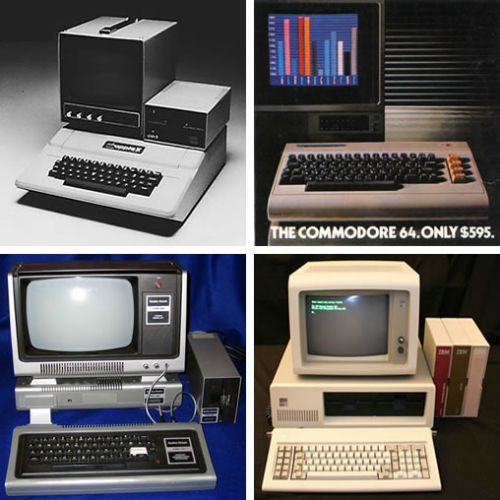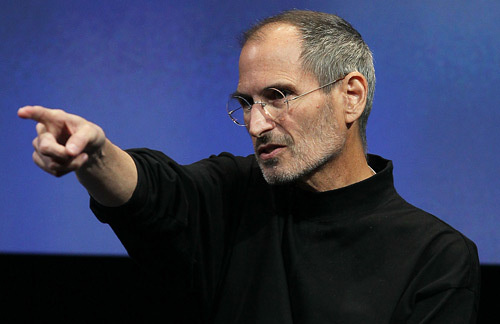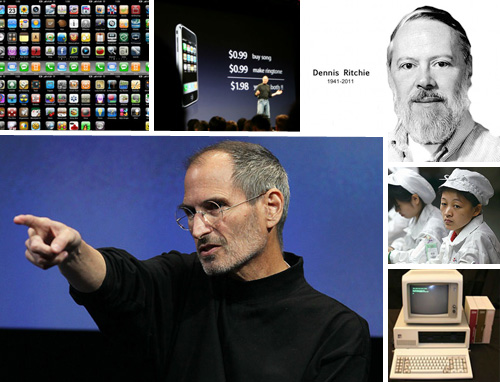Unless you’ve been living under a rock for the past month, you’ve undoubtedly heard about the death of a computing icon, a man who changed how we interact with the virtual world forever. I’m talking, of course, about Unix creator Dennis Ritchie. Just kidding, odds are the first time you heard Ritchie’s name in a sentence was recently, and the sentence had more mentions of “Apple”, “Steve Jobs”, uncapitalized “i”s and the phrase “and also Dennis Ritchie” than “Unix”.
During his life, Steve Jobs was no small source of contention among nerds, and the Mac vs. PC debate raged for year after incomprehensibly rage-filled year (oh by the way we’re talking about Steve Jobs, he’s the one who died in case you missed that). So undoubtedly, once the near-beatifying mourning of Jobs dies down, these same people will begin to whisper a whole slew of critiques of Jobs. Some will be honest and well-reasoned, but this is the Internet so the majority will probably be loud, not very nuanced, and unfair to Jobs. Some critiques such as:
Tablet Computers Pre-Date the iPad by Decades

What They’ll Say:
The concept of a tablet computer is by no means novel at all. In fact, the first patent for a tablet that electronically recorded handwriting was filed in 1888, barely more than a decade after Thomas Edison first demonstrated his incandescent light bulb. And even as far back as 1992, IBM was releasing fully-functional tablet PCs as part of the ThinkPad lineup. Of course these early versions didn’t have the power or functionality that current technology can offer, but all Jobs did was take a half-step forward based on almost a century’s worth of work by other people.
Why It’s Unfair:
No less a great mind than Sir Isaac Newton once said, “If I have seen further it is only by standing on the shoulders of giants.” In a word, no innovation occurs without building on millennia of effort that preceded it. But most importantly for the iPad, it wasn’t the tablet technology that came before it, it was the technology the grew alongside it, most importantly the internet and Wi-Fi. No matter the power of the processor or the amount of memory in a tablet, if you have to plug it in, its fundamental purpose is negated. Tablets were envisaged as early as 1968 in 2001: A Space Odyssey as tools of convenience, not workhorses, as we see a character use a tablet to watch a video message while eating his dinner.
So yes, Jobs didn’t exactly re-invent the personal computer with the iPad, but he did recognize that this oft-failed concept was finally at a point where it could be made feasible, at a time when the market for tablets had been dry for almost a decade. Not giving Jobs credit for gathering the knowledge of the preceding decades and distilling them into an elegant framework because a similar concept had been done before is like not giving Newton credit for creating calculus simply because Leibniz came up with something similar at around the same time.
The iPod is Just a Fancy MP3 Player, Not a Fundamental Innovation

What They’ll Say:
The product that really brought Apple into everyone’s side pocket was the iPod, but what’s so special about it? Sure it allowed you to play MP3s and ditch the pile of CDs you used to carry around, but so did a lot of other products in the market at the same time. And a lot of those were cheaper, more versatile, and didn’t force you to go through proprietary Apple software to get music on your device. The iPod won this war simply because it had the sexiest marketing campaign, not because it was the best value.
Why It’s Unfair:
Raise your hand if you owned an MP3 player before 2001. Now explain the process by which you loaded music onto it. Now explain how in the world you expected that to fundamentally replace a system where you put-a-thing-in-a-thing and press play. The problem with MP3 players wasn’t sexiness or even technology; it was getting the digital files from the record producer to your device. This involved a whole host of technological savvy and legal issues which Apple solved not by making the iPod, but making iPod stupid-simple to sync and (later) the iTunes store, respectively. Though it certainly didn’t hurt that they had some amazing advertising.
Apple’s Computers Haven’t Changed Personal Computing Since the 80s

What They’ll Say:
While all of Apple’s shiny portable products are nice, the truth is that you still do the vast majority of your day-to-day work on either a PC or a laptop. No giant capacitive touch screen is going to change the fact that you can type a lot faster on a keyboard. The personal computer forms the great spine of any productive worker (or particularly productive procrastinator), and Apple hasn’t made any great contributions to the field since the 80s. Sure the iMacs are pretty and all that, but there’s simply no denying the fact that they’re over-priced, underpowered devices for people who don’t know enough about computers. Steve Jobs’ greatest contribution to Apple before 2001 was little more than designing a computer that didn’t come in a beige box. Bravo.
Why It’s Unfair:
No matter how impressive the specs or price of your computer, if you’re shipping a product with features that a majority of your users are nigh-incapable of accessing, that’s riddled with problems that require specialized training to address, you’re shipping an over-priced, under-powered product. What a customer can do with your product is the ultimate test of how powerful it is, not the processor speed or memory size. And by the ease-of-use measure, iMacs come out far ahead. Of course this isn’t to say that someone with proper knowledge can’t do more with a high-powered PC than a Mac, but we’re talking about the average user.
But the far larger and more important point is that Apple didn’t have to revolutionize the personal computer market. PCs are already insanely cheap, Windows XP wasn’t that bad, and, to a certain extent, most people have acquired the working computer knowledge to address basic bugs and open Excel. All iMacs did was fill a niche of people looking for an easier and (yes) more eye-pleasing less intimidating PC. Asking why Steve Jobs focused on mobile devices and didn’t bother to create a better computer is like asking Henry Ford why he made the flashy, expensive automobile instead of a faster horse.
Dennis Ritchie Did More Than Jobs, but Jobs’ Death Overshadowed Ritchie’s

What They’ll Say:
Among other things, Dennis Ritchie created the C programming language and the UNIX operating system. To put it simply, Apple may have made your phone, computer and MP3s, but code written by Ritchie are in virtually every complex electronic device you own. And it’s likely Ritchie’s creations will continue on in some form for decades. What’s more, Jobs operated a greedy, extremely private corporation that pursued numerous lawsuits when competitors got even remotely close to Apple’s technology. In contrast, C and Unix are open-source, and have been used as a powerful resource for entrepreneurs and amateurs alike. Jobs may be the name everyone remembers, but Ritchie had a much larger impact, and should have received a little more publicity.
Why It’s Unfair:
Ritchie was an academic and an engineer. Jobs was a college drop out and an entrepreneur. Jobs was a perfectionist, megalomaniacal CEO with billions of dollars to his name who deliberately sought the spotlight. Ritchie was, by all accounts, a quiet, humble man. Jobs shut down Apple’s philanthropic giving in 1997 and never restarted it. It has also been reported that Jobs kicked way more puppies than Ritchie.
Comparing the two is like comparing oranges and (ahem) apples. You can set up the same sad dichotomy by comparing just about anyone famous with a lot of people who actually contributed something and no one’s heard of. In an ideal world, Ritchie would be the icon and Jobs would be the greedy capitalist, but in the end it still doesn’t diminish the fact that Jobs made substantial contributions to technology.
iTunes is Awkward and Propriety, Making it Difficult to Hold On To Music

What They’ll Say:
If you own an Apple product, you are forced to use iTunes to get your media from your computer to your device. Sure, you can download podcasts and load a fair amount of third-party content on there, but you still have to use Apple’s software every step of the way if you want to play it. Any apps have to be specifically approved by Apple, leading to a media experience greatly out of the hands of the end user, and that’s the way Apple likes it.
Why It’s Unfair:
Years from now when you’re explaining to your grandkids that yes, at one time all media was sold and held in physical form by the end user. And in much the same way you once asked your parents when was the first time they bought a CD instead of a cassette, your grandkids will ask you when was the first time you downloaded a song. Most of us will not tell them the truth (Kazaa), but will instead tell them about the first time we downloaded music was from iTunes. Apple may be annoyingly guarded in what software and hardware will work with their devices, but they (along with others) fundamentally changed the way media is distributed, and—more importantly—proved that in an era of pirating lawsuits, that it could be done profitably.
On top of this, Apple has inspired several copycat devices and marketplaces among all their major competitors, almost all of which are much more open and forgiving of customization. Henry Ford insisted the original Model T would only be sold in black, and then his competitors made them in all sorts of colors. Attacking Apple for an authoritarian but highly functional model is like attacking the Model T because it only came in black—it still worked well and ended up changing the world.
The iPhone and iPad Are For Movies and Games, Not Work

What They’ll Say:
Let’s be honest, the iPad is basically a more expensive, less useful netbook. They’re pretty and eye-popping, and most importantly of all, you can read them while eating cereal at the same time. The iPhone is bright and flashy, but typing anything longer than a few sentences on a touchscreen is exhausting and frustrating. Giving Jobs credit for a “revolution” in these devices is shiny-object salesmanship: he didn’t fundamentally make them better, he just made the brighter, flashier, and more fun.
Why It’s Unfair:
It turns out that all the moaning that came with the switch from keyboard to touch screen was largely unfounded, as recent studies show that the average user can output around 33 words per minute on the touch screen—just a hair below the average for keyboards. Some can even get up to 80 words per minute. On top of this, the larger screen allows you to read e-mails, presentations, photos etc… on a screen that doesn’t cause eyestrain.
But the most important part here is that, especially for the iPhone, any work you do on it is work done during time when you would usually not be able to do this work (since you didn’t have access to a computer). And say what you will about the iPad, it’s bright, crisp screen and smooth lines are a lot more inviting than a giant lumpy textbook. Which is exactly why more and more educational institutions are using them as tools to entice children to read and play educational games, as well as a way for students to communicate with teachers and store all their academic work in one place. Oh and they’re also great tools for our rapidly aging population and the visually impaired.
He Tried to Strangle Apps

What They’ll Say:
The biggest beef that nerds likely have with Jobs is his enmity toward open-source. To the independent developer, Apple is the tallest, most lucrative fortress with the most impenetrable walls on the planet. Everything is developed in-house under Jobs’ watchful, perfectionist eye, any third-party apps have to go through a rigorous approval process, and Apple gives only piecemeal, begrudging support to developers. Jobs’ attempt to stop the App Store is viewed as one of his few professional mistakes, even by his fans.
Why It’s Unfair:
Most people seem to forget that every iPhone comes equipped with a button that takes them to the Internet, a world filled with all of the smut and apps you’d like — none of it restricted by Apple, and this space is only getting bigger and more capable. More and more, it’s getting harder to distinguish what content is based on your browser. Jobs realized this, and his resistance to the App Store seemed to come less from the fact that he didn’t like third-party development on the iPhone, it’s just that he wanted it to be done in the cloud. Those of us who don’t live in Cupertino and have experienced the hellacious nature of AT&T’s network can attest that, while a noble idea, going completely to the cloud simply isn’t feasible yet, though Jobs was probably only a few years off (after all, without apps, how would we play Angry Birds on the subway?).
He Contributed to the Myth of the Silver Bullet CEO

What They’ll Say:
In an era where Americans are particularly…perturbed at the growing economic inequality in this country, where CEOs make 475 times the average worker, here comes Steve Jobs perpetuating the myth that all a company needs is a magical CEO to save them. These CEOs demand exorbitant pay, rarely pan out, and then take millions in golden parachutes. Steve Jobs was a visionary CEO for his company, but his visibility will only make corporate America’s views on management more perverse, tyrannical, and full of magical, short-term thinking.
Why It’s Unfair:
Steve Jobs’ salary: $1. Of course he makes millions a year in stock appreciation and has numerous other investments, but Jobs was part of a growing club of CEOs that take only a small, symbolic salary and draw all of their income from the company’s growth. While this may seem like an empty gesture, let’s say that, theoretically, Jobs demanded the salary of $33 million including bonuses that Ray Irani of Occidental Petroleum does. With that money, he’d essentially be depriving Apple of more than 400 talented engineers making around $75,000 a year. For some perspective, the average firm in the US employs roughly 16 people. Jobs may be the quintessential magic CEO in most peoples’ minds, but if more CEOs were like him, outrageous CEO pay wouldn’t be a problem in the first place.
Outsourcing Products to Foxconn

What They’ll Say:
Apple’s relationship with Chinese supplier Foxconn is storied and gruesome. In addition to the high-profile suicides a few years ago, stories emerge of 34-hour shifts and employees so young that their hands become mangled and twisted as they grow into the repetitive work. Reports indicate that Foxconn only pays the equivalent of $300 dollars a month. Despite all their clean, sexy, innovative flashiness, the iPhone was built on the pain and suffering of hundreds.
Why It’s Unfair:
First off, Jobs was a good CEO, not necessarily a foolhardy philanthropist who would inexplicably force his company to source products from factories that would drive costs several orders of magnitude higher than the competition. In a word, outsourcing wasn’t his choice; it was made for him by the market.
In addition, at the risk of sounding like a heartless imperialist, Foxconn pays far better than the average Chinese job. Plus Foxconn recently raised wages, and are seen as a positive force of upward wage growth in China. While we should never get comfortable saying “they’ll take their slave wages and unsafe working conditions and like it”, and always pressure foreign and domestic suppliers to funnel profits into wage growth and better worker conditions—there is and will always be some dark underbelly to the world capitalism that we all support. If this is your first time coming face-to-face with this fact you should also know that Santa Claus and the Easter Bunny aren’t real, and that the failings of capitalism can’t be laid across Jobs’ shoulders any more than they can be laid at the feet of everyone who bought an iPhone.
He Struck a Deal With the Devil Dealing with AT&T

What They’ll Say:
When you hear complaints about peoples’ smartphones, they rarely complain about the operating system, the touch screen, or even the ergonomics. The number one complaint is always about dropped calls, slow data speeds, and text messages that vanish into the ether, only to reappear about 8 hours later along with 4 to 5 copies. For all the perceived faults of Apple, their product is streamlined, reliable, and does what you ask it to. Meanwhile, AT&T and other telecoms have responded by throttling data plans and continuing to charge exorbitant rates for services as basic and inexpensive as text messaging. Jobs clearly believed in cloud-based services as an end-game, so why did he sell his soul through an exclusive deal to a company whose profit structure depends on throttling everything that makes the iPhone valuable? Wouldn’t it make more sense to offer it up on all major carriers to encourage competition?
Why It’s Unfair:
The short answer is basically US networks couldn’t handle the iPhone’s increased data demands, and Apple needed a carrier willing to build out the network improvements necessary to support the phone. You may complain about how long it takes to load your joke-a-day column each morning, but before 2007, even decently fast Internet on your phone was a laughable pipe dream. You know how when your phone (if you have AT&T) loses a good data signal, displays the dreaded “E” and speeds drop to next to nothing? Before the iPhone, no network had even that lumbering speed. Yes the way in which Apple went about this was annoying to those who were locked into two year contracts with other providers, and yes there might have been some shady, under-the-table kickbacks going on. But Apple pretty much single-handedly forced some of the biggest improvements in network infrastructure in a decade. Far from a deal with the devil, Apple essentially told the devil “Okay we’re gong to make this deal, but in return you have to be slightly less of a dick”.
You may think Steve Jobs was a greedy megalomaniac, but there’s little doubt that he knew what he was doing and did it well. In a time when Americans are near-desperately searching for fast-fading examples of American exceptionalism, Steve Jobs was one of the few that really remained. In the years to come his life, business and management style will undoubtedly become the subject of many studies and books. Most of us can’t really touch the unfolding narrative of Steve Jobs, but maybe after this article some of the comments on blogs will be a little less petty and asinine.
